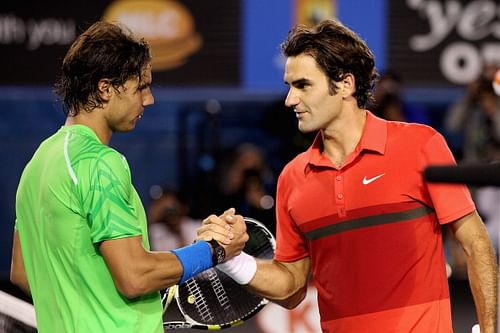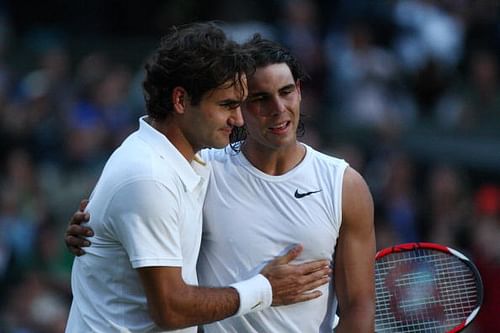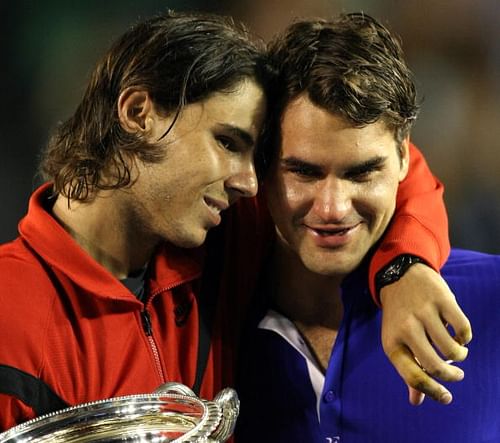
End of an era - The Rafa-Roger rivalry

There was a time when a Grand Slam final without Rafael Nadal or Roger Federer seemed improbable to a tennis fan. Times have changed, power has changed guard and the game which was once dominated by the duo of Federer-Nadal has now witnessed the rise and rule of a certain Serb called Novak Djokovic.
I think all tennis fans, including Djokovic fans, would agree that the best moments in tennis in the past 5-6 years have come from Rafa-Fedex matches. No tennis fan could possibly forget Rafa’s triumph in the Wimbledon Final 2008, which has been touted as the best match ever played. Who could forget Roger breaking to tears after losing to Nadal in the final of the 2009 Australian Open? They did not just produce epic matches, along the way, they transformed each other into doing things fans earlier didn’t think were possible. Federer, who was known to be calm and composed on the court became much more vocal during the course of the rivalry. Nadal, whose game was earlier believed to be not good enough for the hard courts, went on to win all the four Grand Slams in 2009. This rivalry is probably the greatest of all the rivalries ever to have graced the tennis Court.
Nadal entered the fray at a time when Roger Federer controlled the game. All those who saw him play in the clay courts said his game was tailor-made for it and he wouldn’t be half as successful on other surfaces. Rafa denied Roger of a career slam for two years before meeting him in the final of the Wimbledon in 2006. This was Rafa’s first Grand Slam on grass, his march to the final silenced his critics who then changed their remarks to, “Rafa may do well on grass, but he will have serious issues on the hard courts.” Federer then showed why he is called the ‘the King of grass’ as he went on to beat Rafa in 4 sets. The rest of the year didn’t go too well for Rafa as the hard court season began and there was a snide expression on the faces of his critics.
As the clay court season resumed in 2007, the Rafa-Roger rivalry took centre-stage. Rafa’s clean sheet on the clay court came to an end as he lost for the first time after winning 81 matches. And who else to break the streak, but none other than Roger Federer. But Nadal went on to win the Roland Garros the third time in a row, the first time a player had achieved the feat after the legendary Bjorn Borg. But it was the final of Wimbledon 2007 which caught the attention of the world and the critics began to wonder if it was the signal for greater things to come. Federer had won 4 Wimbledons in a row and he had a chance to equal Bjorn Borg’s record of 5 consecutive Wimbledon wins. Roger Federer being the world number 1 and the King of grass started the match as the favourite to win the match and he drew first blood as he won the first set after a good fight. Nadal managed to win the second set and when Nadal won the fourth after losing the third, Federer had to play a fifth set in a Wimbledon final for the first time. For the first time it seemed the King would be overthrown by the matador from Spain. Nadal had two break points each in two consecutive games but he couldn’t come up with brilliance when it mattered the most and Federer went on to win the fifth set 6-2. But things were clear, with Nadal getting better with every tournament he played, Federer would have to pull up his game to maintain his position at the top.
Perhaps the year 2008 can be called the year when the crown changed hands from Federer to Rafa. In the Australian Open, both were eliminated in the semifinals by Novak Djokovic and Jo-Wilfred Tsonga respectively. Then came the clay court season. Rafa after dominating the clay court season, went on to win the French Open, beating Federer in straight sets! With that, he equalled Bjorn Borg’s record of winning 4 Roland Garros in a row. Then came ‘The match of the era’. In a rain hindered final, Rafael Nadal managed to end Federer’s reign in Wimbledon in an epic 5-setter which lasted 4 hours and 48 minutes. Die hard tennis fans will never be able to forget the tie-breaker in the 4th set which Federer managed to win 9-7. The tie breaker saw two warriors play some of the best tennis ever played. That match is the longest final ever played in the Wimbledon, and also referred to as, “The best match ever played”.

After winning Wimbledon, Nadal became the number 1 player in tennis for the first time in his career. 2009 saw a bright start for the Spaniard. Another Rafa-Fed Grand Slam final and another game which the former won. After the match, the unthinkable happened. Roger Federer, the master Swiss, broke into tears. Who would have thought the man who had won 13 Grand Slams at the time would break down in tears after losing a final. This was Rafa’s first Grand Slam on hard courts and all those who previously thought Rafa’s game was inadequate for the hard courts were silenced once and for all. But the rest of the year went awfully wrong for the matador. A loss to Robin Soderling saw him out of the French Open that year, it was his first loss on the dirt of Paris. Without Nadal guarding the trophy, Federer went on to kiss the Roland Garros title, thus completing the career slam. Nadal withdrew from the Wimbledon due to his persisting knee injury. Federer reclaimed his throne, winning the Wimbledon again for the 6th time in his career. Federer then lost out to Del Potro in the final of the US Open. But without a doubt, this was Roger’s year.
The first Grand Slam of 2010 saw the return of Rafael Nadal. But the fans were denied a Rafa-Roger final by Andy Murray who beat the Spaniard on his road to the final. Federer won the Australian Open that year, but the rest of the year belonged to his nemesis. Nadal won the French Open, the Wimbledon and the US Open to complete his career slam, just one year after the great Swiss. This was the golden time of tennis, records were being smashed one after the other and two players completing their career slams in consecutive years further glorified the era. But the year did not see a single Rafa-Roger clash in the finals of Grand Slams, which happened for the first time since 2006.
The duo met for the last time in a Grand Slam final till date in the 2011 French Open final, which again the Spaniard won. Nadal had won 6 out of his 8 Grand Slam finals against the Swiss. The year 2011 saw the Rafa-Roger rivalry taking backstage as two players emerged to take centre stage, Novak Djokovic and Andy Murray and since then, it has been this pair which has raked in the crowds. In 2012, Nadal and Federer won two Grand Slams but against different opponents in the final. With Federer ageing and Nadal having fitness issues, it looked as if the time for the awe-inspiring rivalry was up. Media and experts have been suggesting the Novak-Murray rivalry is set to replace the previous duo of Roger and Nadal. But there are numerous reasons why the Nadal-Federer rivalry can never be replaced.

Roger Federer and Rafael Nadal are undoubtedly two of the greatest players the game has ever witnessed. The rivalry between them doesn’t just boost the competitive spirit of the game, but exemplifies the beauty of the sport. On one hand we have the Swiss, who radiates elegance and there is a certain amount of arrogance involved which adds to the pleasure of watching him play. And on the opposite side, we have Rafa, who works as hard on the court as a peasant does on his fields. There is a lot of physicality involved in the manner in which Nadal plays. Both their styles of play say a lot about their character. Federer plays with a touch of arrogance, dismantling his opponents. Nadal on the other hand plays with a lot of humility, treating his opponents as a farmer treats his crops, works hard on them to reap the rewards. We can safely say the playing styles of Rafa and Roger are polar opposites, and if Federer is the classy autocrat, Nadal is the revolutionary peasant!
With Novak Djokovic realizing his true potential and Murray starting to fulfil his talent, it seems as if the times of Nadal-Federer finals are up. And thought we might see the both of them winning Grand Slams in the coming months, there are serious doubts about whether the they will feature in the same final. Therefore, it truly is, the end of an era, the era of the Nadal-Federer rivalry.